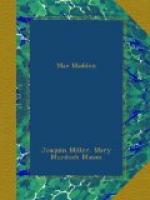The rich life in Mae’s blood was surging in her veins and must be let off in some way. If she had had her music and a piano she might have thrown her soul into some great flood-waves of harmony. The Farnesina frescoes of Cupid and Psyche over across the Tiber would have helped her, but here she was alone, and so she did what so many “fervent souls” do—scribbled her heart out in a colorful, barbarous rhyme. Mae had ordinarily too good sense for this, too deep a reverence for that world of poetry, at the threshold of which one should bow the knee, and loose the shoe from his foot, and tread softly. She didn’t care for this to-day. She plunged boldly in, wrote her verse, copied it, sent it to a Roman English paper, and heard from it again two days later, in the following way.
The entire party were breakfasting together, when Albert suddenly looked up from his paper and laughed. “Look here,” he cried. “Here is another of those dreadful imitators of the Pre-Raphaelite school. Hear this from a so-called poem in the morning’s journal:
’The gorgeous
brown reds
Of the full-throated
creatures of song.’”
“I don’t see anything bad in that,” said Eric, helping himself to another muffin. “What is the matter with you?”
“Matter enough,” returned Albert. “Because their masters, sometimes, daub on colors with their full palettes and strong brushes, this feeble herd tag after them and flounder around in color and passion in a way that is sickening.”
“Go on,” shouted Eric, “he is our own brother, Mae, after all, you see. Fancy my Lord Utilitarian turning to break a lance in defence of beauty. Edith, you and the picture-galleries are to blame for this.”
Mae had been paying great attention to her rolls and coffee, and very little apparently to the conversation, but she spoke eagerly now. “Their masters do not daub. They do hold palettes full of the strongest, richest colors, and dare lay them, in vivid flecks, on their canvas. They do not care if they may offend some modern cultivated eyes, used only to the invisible blues and shadowy greens and that host of cold, lifeless, toneless grays, of refined conventional art. They know well enough that their satisfying reds and browns and golds of rich, free nature will go to the beating hearts of some of us.”
Mae had a way of dashing into conversation abruptly, and the Madden family had been brought up on argument and table-talk. So the rest of the party ate their breakfast placidly enough. “Mae’s right,” said Eric, a trifle grandly, “only, to change the figure of speech for one better fitted for the occasion, they may satiate, though they never starve you. But they are wonderfully fine, sometimes. O, bother, I never can quote, but there is something about ’I will go back to the great sweet mother."’
“Or this,” suggested Mae,
“’And to
me thou art matchless and fair
As the tawny sweet twilight,
with blended
Sunlight and red stars
in her hair.’”




